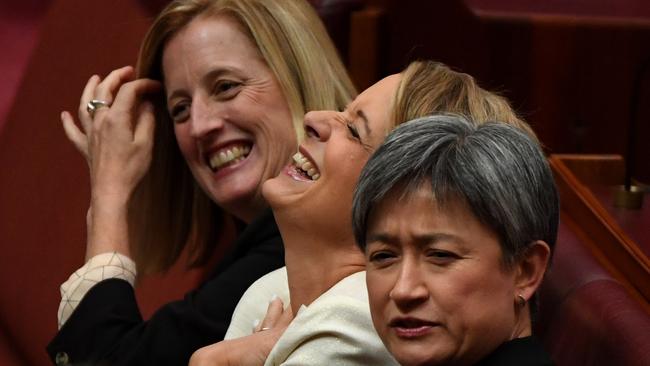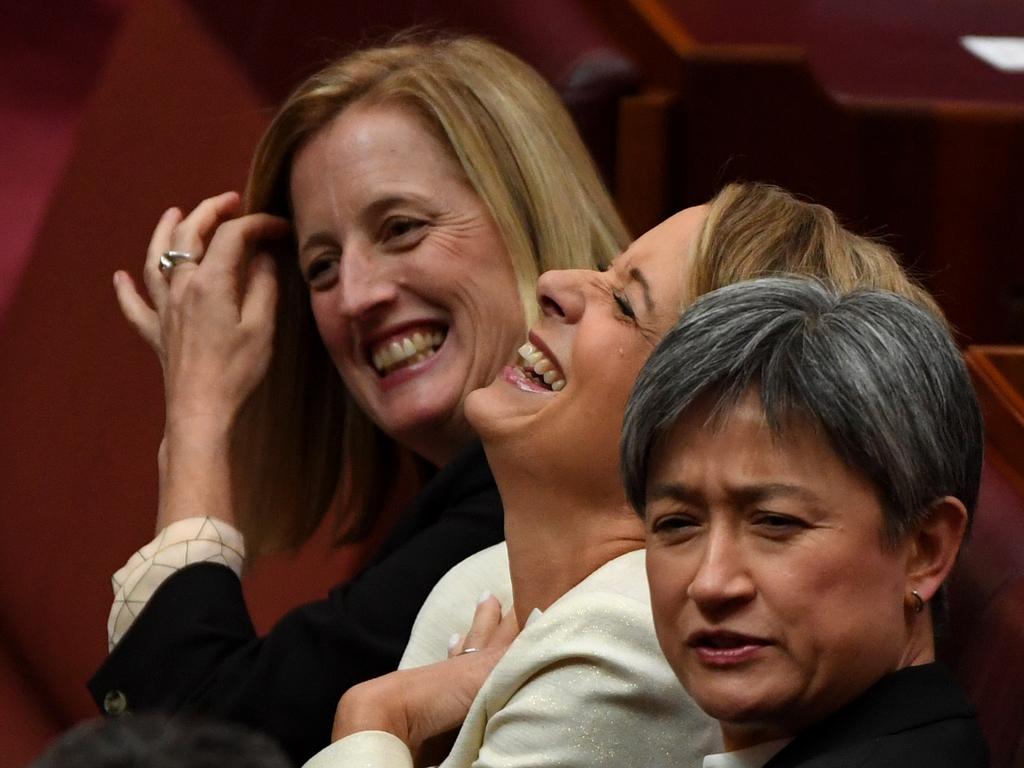
To that end, here are two observations concerning the way so-called progressive media figures reported, analysed and judged the bullying allegations made by the late Labor senator.
First, men in that media milieu have been more even-handed about Kitching’s allegations than women in those circles. Second, it is hard to recall a clearer example of barefaced hypocrisy from some of those so-called progressive women.
When Kitching’s bullying allegations emerged after her death, these women quietly dumped the deeply flawed progressive shibboleth that all women must be believed. A new, equally flawed mantra appears to have emerged since Kitching’s death – that only certain kinds of women should be believed. And Kitching is not one of them.
Phil Coorey provided a stellar example of how to cover this fraught issue with fairness and class. Writing in The Australian Financial Review last week, Coorey was astute enough to report that while factional politics was at play, “It was always passing strange that the better she (Kitching) performed, the more she seemed to be punished.”

Coorey detailed the punishment dished out to Kitching, how she was demoted, shifted sideways, ostracised, belittled, and forced by Labor leader Anthony Albanese to fight for her preselection despite her stellar achievements as a first-term senator, achievements that dwarf those who have bullied her.
Coorey’s analysis of claims by Labor’s leadership that the phrase mean girls is disrespectful was equally crisp and correct: “Bunkum,” wrote Coorey. “It’s about as offensive as ‘boys’ club’.”
In The Age last week Rob Harris wrote with acerbic accuracy that the description of his friend Kitching as a patriot “appeared to make many progressives deeply uncomfortable”. Harris laid out Kitching’s achievements, which threatened the egos of her less competent Labor colleagues.
Kitching, wrote Harris, “thought protecting Australia’s democracy was more important than making the party look bad or making senior figures feel uncomfortable”.
Contrast these analyses with the groupthink among many women in so-called progressive media circles.
Their shifting standards when it comes to bullying claims by Kitching can only help Labor bury this scandal. Whereas so many of these female journalists rightly piled on Scott Morrison for his head-in-the-sand approach to the treatment of women inside his own party, they have struggled to apply the same level of accountability to Labor.
Their feckless reporting lets the Labor leader off the hook, along with deputy leader Richard Marles, with whom Kitching shared her serious allegations of mistreatment, and the alleged perpetrators of the bullying, Penny Wong, Kristina Keneally and Katy Gallagher.
What exactly did Marles do after Kitching reported the bullying allegations to him? Did he tell Albanese? If not, why not? If so, what did the Labor leader do?
Instead of asking these questions, a clique of progressive women in the media have sung from the same song sheet, claiming this saga is best explained as “nasty politics”. Keen to draw the Prime Minister into Albanese’s shame, The Sydney Morning Herald’s Jacqueline Maley described it as an “equal opportunity” affair.


A year ago, when claims of harassment were made against Liberal MPs, The Guardian’s Katharine Murphy pointed a scathing finger at “Blokes Being Reprehensible at Your Expense”. Now, with bullying claims levelled against Labor women, Murphy tried to douse Kitching’s allegations. “This is fundamentally a story about politics,” she wrote on Saturday.
Like Maley, who said it was “icky”, Murphy was more concerned that Wong, Keneally and Gallagher had been called “mean girls” than exploring the details of Kitching’s claims. In a single sentence, Murphy waved away bullying claims as “the dominant media narrative”.
Murphy, on the other hand, was going to tell you the real story – the “underlying friction”, the “periodic confrontations”, the “undeclared dynamic”. She spoke of “suspicion” and “trust issues” of Labor’s senior women towards Kitching.
Murphy mentioned “innocent forays” that are assigned “greater meaning”. “There is never just one perspective, and suffice to say, all of that is one hell of a brew,” she said. It’s curious that Murphy and others among her clique didn’t express similar scepticism when Rachelle Miller made bullying allegations against her boss and former minister, Alan Tudge. Underlying friction? Undeclared dynamics? Progressive women showed no interest in digging deeper.
Who shares my sinking feeling that, when it comes to allegations of bullying by Kitching, this clique of female journalists doesn’t regard her as the right kind of woman to be believed? Sadly, these political journalists appear to have succumbed to the same tribal political culture they routinely denounce and deplore. And inevitably, their double standards hand Labor’s mean girls a leave pass.
To be honest, I expected far more balance, greater depth from the ABC’s Virginia Trioli. But hers was surely the dizziest analysis.
Trioli didn’t just join the conga line of left-wing women who would rather cry crocodile tears over the mean girls label than address the substance of Kitching’s claims. Trioli compared Kitching’s claims of being bullied, ostracised and belittled by Wong, Keneally and Gallagher to that of Petro Georgiou, whose preselection was challenged by Josh Frydenberg in 2006. “No one called him (Frydenberg) a ‘mean boy’,” wrote Trioli. Alas, this was not the sucker punch Trioli hoped to deliver, given that she provided no proof that Georgiou had been bullied by Frydenberg.
There is another defect among these female journalists who have sought to downplay Kitching’s allegations of bullying. They have insisted that we not treat Kitching as a helpless victim (Murphy) or a vulnerable ingenue (Trioli).
No one – not a single person – has described Kitching in that manner. She was, famously, a warrior for her brand of Labor politics. Are these women suggesting Kitching’s claims should be disregarded in part or in full because she was a strong and confident woman? Surely they are not inferring that only a shy wallflower can be bullied?
There is no joy in the observation that, in the left-wing press, more male journalists have been fairer when reporting Kitching’s claims than their female colleagues.
Nor is there any joy in exposing the hypocrisy from some of these women. But the alternative is even more wretched; it would mean turning a blind eye to how excuses can only aid and abet Labor’s mean girls.







Labor’s “mean girls” and their apologists in the media should consider this public service announcement: Kimberley Kitching’s allegations of bullying by Labor women won’t go away.